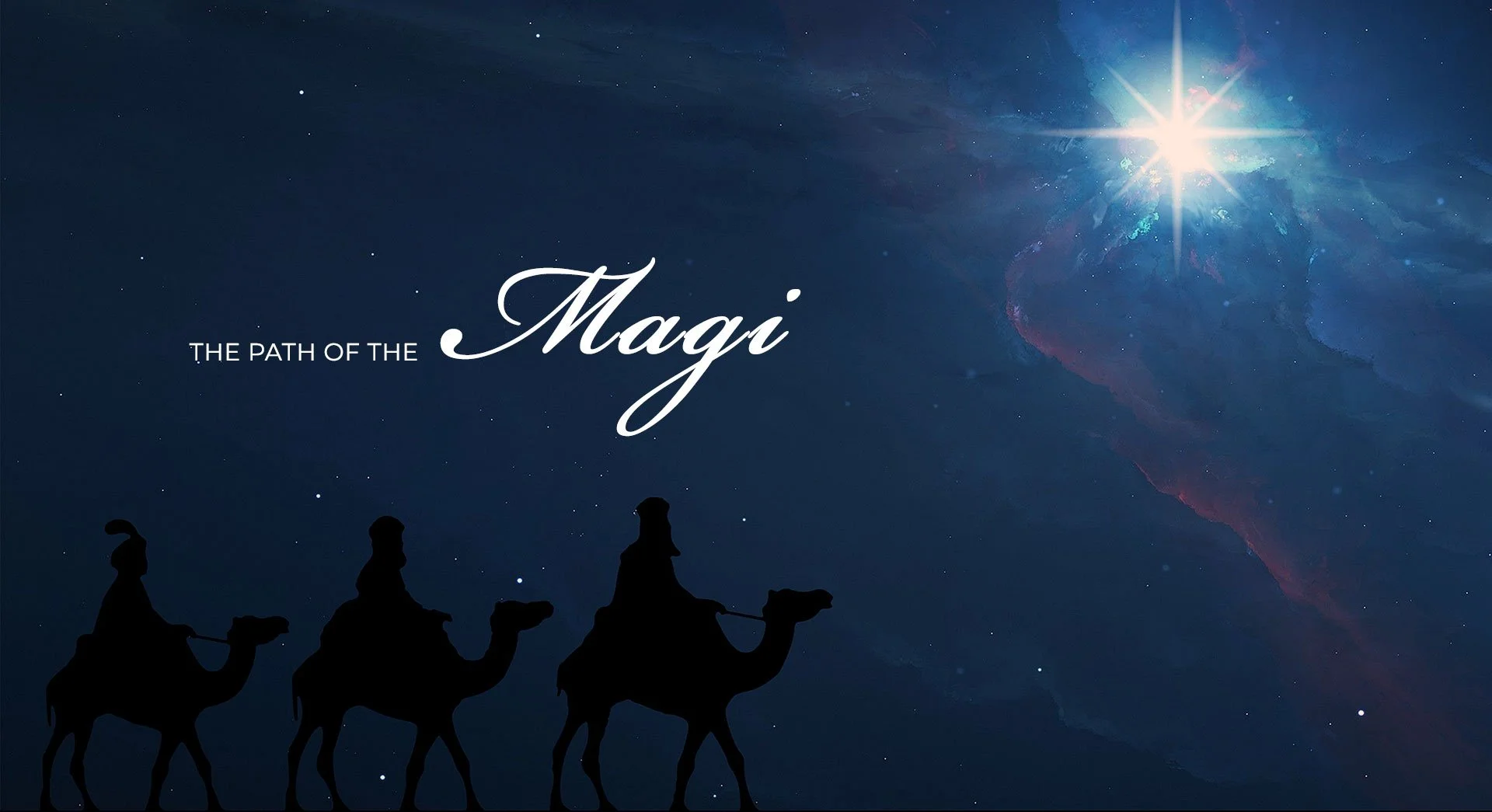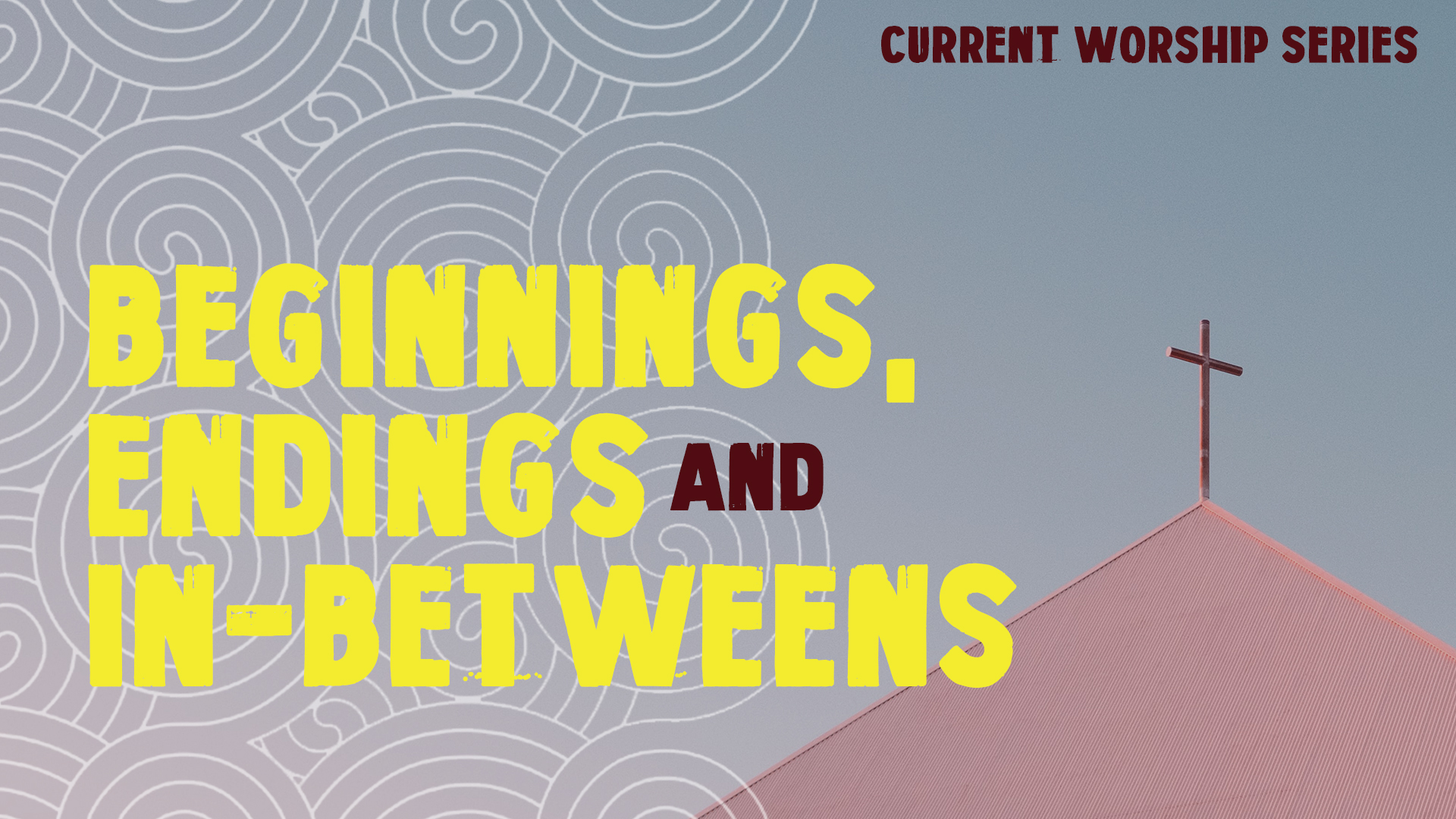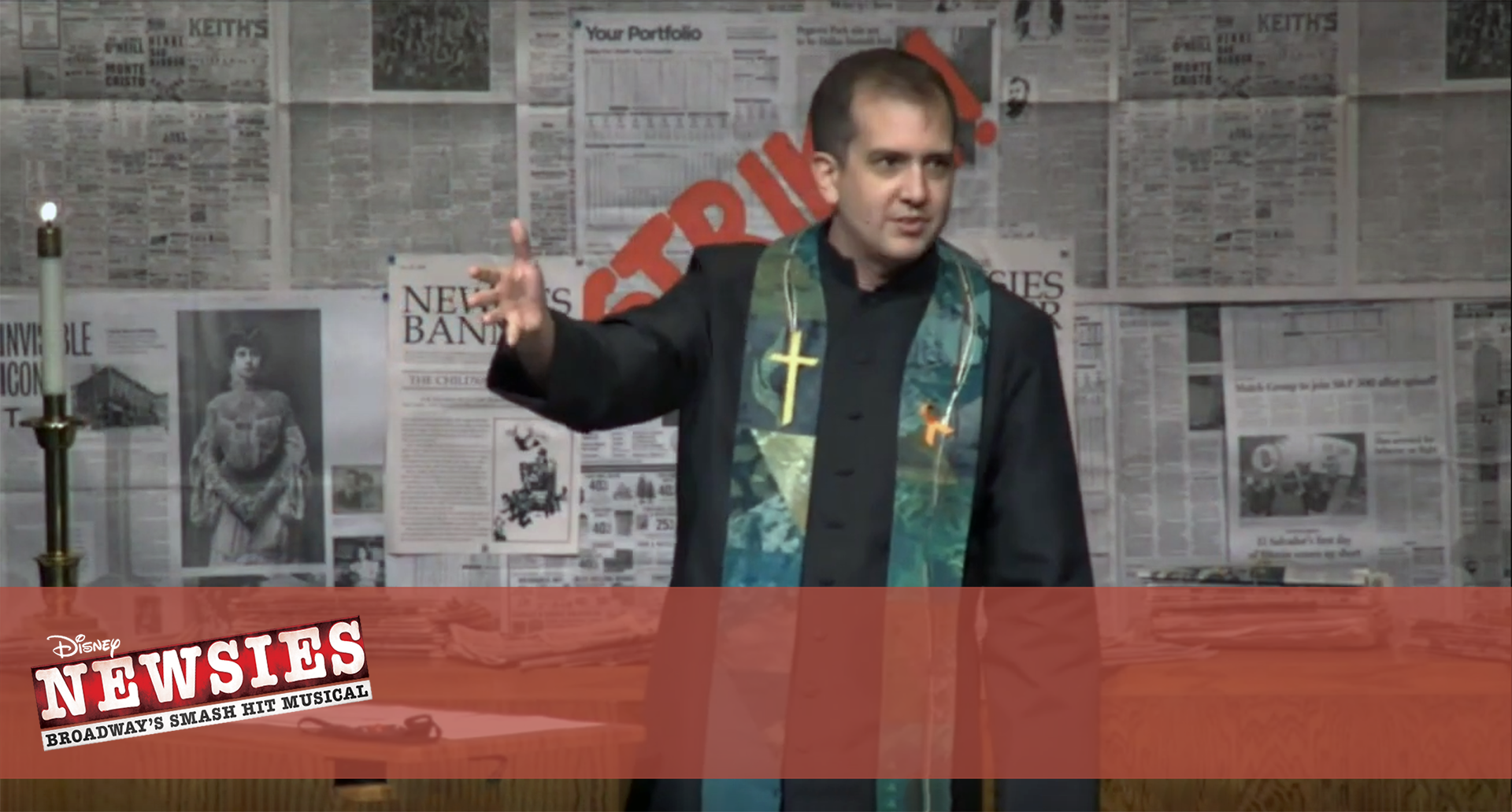The West Side Of The River Jordan
Singing, dancing, and aggressive snapping. That’s right! It’s Bible on Broadway season at AUMC, and we’re kicking off with the iconic West Side Story! This tale of star-crossed lovers Tony and Maria–and the tragic conflict between the rival Jets and Sharks–is not only timeless, it also brings up themes found also in… Deuteronomy? Welcome to the “West Side” of Mount Sinai.
Singing, dancing, and aggressive snapping. That’s right! It’s Bible on Broadway season at AUMC, and we’re kicking off with the iconic West Side Story! This tale of star-crossed lovers Tony and Maria–and the tragic conflict between the rival Jets and Sharks–is not only timeless, it also brings up themes found also in… Deuteronomy? Welcome to the “West Side” of Mount Sinai.
Radicals (Week 3)
Rev. Edlen Cowley’s message speaks on the power of young people and how they speak into the present while living into their (and our) future. The powerful of transformation of Naaman was tied to the words of a young slave girl. Malala Yousafzai’s passion for girl’s education spoke to my heart so many years ago when she was shot at almost point-blank range.
Radicals (Week 3)
Rev. Edlen Cowley’s message speaks on the power of young people and how they speak into the present while living into their (and our) future. The powerful of transformation of Naaman was tied to the words of a young slave girl. Malala Yousafzai’s passion for girl’s education spoke to my heart so many years ago when she was shot at almost point-blank range.
Radicals (Week 2)
In the “Radicals” worship series, we will take a close look at several prophets - some major, some minor, and some who might be unfamiliar to you. We will hear their words and understand the warnings - or joy - shared with God’s people. Finally, we’ll look at some modern prophets and compare their proclamations with the practice of the Biblical prophets of old. Who among us today is sharing prophetic wisdom and in what way?
In the “Radicals” worship series, we will take a close look at several prophets - some major, some minor, and some who might be unfamiliar to you. We will hear their words and understand the warnings - or joy - shared with God’s people. Finally, we’ll look at some modern prophets and compare their proclamations with the practice of the Biblical prophets of old. Who among us today is sharing prophetic wisdom and in what way?
Epiphany - The Path of the Magi
Having followed the star, they journey to find the newborn King of the Jews. They offer him gold, frankincense, and myrrh. But the Magi have a more precious gift for us. In the night, they heard the Spirit warning them not to return to Herod but return home by a different route. They gave us the gift of listening to God's Spirit and the confidence to follow a different path. Just as they trusted the appearance of the star to take them to the King, they trusted the voice of the Spirit. They step into the unknown, without a star to lead them, and rejoicing, follow the voice of God.
Having followed the star, they journey to find the newborn King of the Jews. They offer him gold, frankincense, and myrrh. But the Magi have a more precious gift for us. In the night, they heard the Spirit warning them not to return to Herod but return home by a different route. They gave us the gift of listening to God's Spirit and the confidence to follow a different path. Just as they trusted the appearance of the star to take them to the King, they trusted the voice of the Spirit. They step into the unknown, without a star to lead them, and rejoicing, follow the voice of God.
The Songs of Advent (Week 3)
As we light the Shepherd's candle in Advent, we listen to Vivaldi's best known sacred work, his Gloria. We call to mind the angel's proclamation to the shepherds who were the first to hear of the birth of Christ. "Glory to God in the highest and on earth peace, goodwill towards all!" Luke 2:14
The glory of heaven entered the world in darkness. To those who wait in the darkness of oppression, the angels proclaim that the light of Christ is entering the world. And this child is to be the comfort and joy of all.
As we light the Shepherd's candle in Advent, we listen to Vivaldi's best known sacred work, his Gloria. We call to mind the angel's proclamation to the shepherds who were the first to hear of the birth of Christ. "Glory to God in the highest and on earth peace, goodwill towards all!" Luke 2:14
The glory of heaven entered the world in darkness. To those who wait in the darkness of oppression, the angels proclaim that the light of Christ is entering the world. And this child is to be the comfort and joy of all.
Beginnings, Endings & In-Betweens (Week 6)
What is Christian Community? Pastor Scott examines Acts Chapter 2 to see how Luke described the church's infancy in his description of their communities. The writer speaks of great awe, generosity, and authenticity shared among them. They spent time, not just in worship, but in each other's lives and each other's homes, accepting each other just as they are. They were a family.
What is Christian Community? Pastor Scott examines Acts Chapter 2 to see how Luke described the church's infancy in his description of their communities. The writer speaks of great awe, generosity, and authenticity shared among them. They spent time, not just in worship, but in each other's lives and each other's homes, accepting each other just as they are. They were a family.
Beginnings, Endings & In-Betweens (Week 5)
Pastor Scott's sermon series on Beginnings, Endings & In-Betweens looks at the biblical concept of the "end times." What we believe about the end informs how we live in the present. If our belief in God somehow leads us to be less caring, we are worshiping something less than divine. So what do these end-times look like? The Apostle Paul encourages those "in Christ," who have already been reconciled to God through Christ as a "new creation," are themselves called to the ministry of reconciliation. How is God leading you in your ministry of reconciliation?
Pastor Scott's sermon series on Beginnings, Endings & In-Betweens looks at the biblical concept of the "end times." What we believe about the end informs how we live in the present. If our belief in God somehow leads us to be less caring, we are worshiping something less than divine. So what do these end-times look like? The Apostle Paul encourages those "in Christ," who have already been reconciled to God through Christ as a "new creation," are themselves called to the ministry of reconciliation. How is God leading you in your ministry of reconciliation?
Beginnings, Endings & In-Betweens (Week 4)
Today Pastor Scott examines the story of Lazarus, whom Jesus raised from the dead—continuing on the theme of his sermon series, Beginnings, Endings, and In-Betweens. What do you imagine happens when the body dies? The Jews had their traditions about the afterlife—it was little more than a state of limbo where you went to wait for the resurrection on the last day. Other religions speak of reincarnation. Dante outlines both paradise and torment. What do you think happens on the other side of the grave? What can we learn from the story of Lazarus?
Today Pastor Scott examines the story of Lazarus, whom Jesus raised from the dead—continuing on the theme of his sermon series, Beginnings, Endings, and In-Betweens. What do you imagine happens when the body dies? The Jews had their traditions about the afterlife—it was little more than a state of limbo where you went to wait for the resurrection on the last day. Other religions speak of reincarnation. Dante outlines both paradise and torment. What do you think happens on the other side of the grave? What can we learn from the story of Lazarus?
Beginnings, Endings & In-Betweens (Week 3)
What is your framework for Truth? It's not a simple question. Ask ten people, and you'll probably get ten different answers. So this week, Pastor Scott lays out the fourfold Wesleyan approach to spiritual understanding: Scripture, Tradition, Reason, and Experience. Each of these can be unpacked at great length, but the shorthand acknowledges not all scripture is created equal; tradition for tradition's sake is nostalgia, and reason isn't a substitute for faith. Somewhere along the journey, you begin to understand that Truth must be lived before it can be fully understood. And through your lived experience, what resonates is Truth.
What is your framework for Truth? It's not a simple question. Ask ten people, and you'll probably get ten different answers. So this week, Pastor Scott lays out the fourfold Wesleyan approach to spiritual understanding: Scripture, Tradition, Reason, and Experience. Each of these can be unpacked at great length, but the shorthand acknowledges not all scripture is created equal; tradition for tradition's sake is nostalgia, and reason isn't a substitute for faith. Somewhere along the journey, you begin to understand that Truth must be lived before it can be fully understood. And through your lived experience, what resonates is Truth.
Beginnings, Endings and In-Betweens (Week 2)
Last week, Pastor Scott talked about the beginning of the Christian journey - our baptism. This morning, he looks at the food for the journey – the sacrament of communion. Using the depiction of the disciples in Matthew's gospel, before, during, and after the last supper, Jesus must have been so disappointing in his hand-picked brothers. Yet he broke the bread and poured the cup of forgiveness with, undeniably, some of the world's worst friends – which begs the question, is your table open to all? Listen to the Good News!
Last week, Pastor Scott talked about the beginning of the Christian journey - our baptism. This morning, he looks at the food for the journey – the sacrament of communion. Using the depiction of the disciples in Matthew's gospel, before, during, and after the last supper, Jesus must have been so disappointing in his hand-picked brothers. Yet he broke the bread and poured the cup of forgiveness with, undeniably, some of the world's worst friends – which begs the question, is your table open to all? Listen to the Good News!
Bible On Broadway (Newsies)
AUMC's Bible On Broadway series focuses today on the historical musical drama, Newsies, depicting the 1899 newsboys' strike against publishing magnate Joseph Pulitzer. In this campaign for dignity, we see the human economy of scarcity juxtaposed against God's economy of abundance. Pastor Scott leads us down this same path in Matthew Chapter 15 with the telling of the Canaanite woman. Dignity is not a limited resource. We may live in a zero-sum world, but with our faith fixed on the One who provides, all are fed from the Master's table.
AUMC's Bible On Broadway series focuses today on the historical musical drama, Newsies, depicting the 1899 newsboys' strike against publishing magnate Joseph Pulitzer. In this campaign for dignity, we see the human economy of scarcity juxtaposed against God's economy of abundance. Pastor Scott leads us down this same path in Matthew Chapter 15 with the telling of the Canaanite woman. Dignity is not a limited resource. We may live in a zero-sum world, but with our faith fixed on the One who provides, all are fed from the Master's table.
Bible On Broadway (SpongeBob)
This morning, AUMC's Bible On Broadway series focuses on belonging from the musical SpongeBob. The story celebrates friendship, cooperation, unity, and inclusion - very much the same way the apostle Paul instructs the church at Corinth about the body of Christ. Every individual gift is given for the common good – the good of the whole body. Even if you're only a simple sponge, you are essential to the whole! At Arapaho, we belong to each other. Lean into your gifts, whatever they are. You belong here.
This morning, AUMC's Bible On Broadway series focuses on belonging from the musical SpongeBob. The story celebrates friendship, cooperation, unity, and inclusion - very much the same way the apostle Paul instructs the church at Corinth about the body of Christ. Every individual gift is given for the common good – the good of the whole body. Even if you're only a simple sponge, you are essential to the whole! At Arapaho, we belong to each other. Lean into your gifts, whatever they are. You belong here.
Bible On Broadway (Come From Away)
Most of us have our own stories about September 11, 2001. “Come From Away” shares the story of the town of Gander, located in the northeastern part of Newfoundland, Canada. This small town of 9,000 was changed overnight when thirty-eight jets headed for the United States were diverted to the island. Over 6,500 displaced strangers from almost 100 countries were now stranded on the runways. How would the “Islanders” respond to the sudden influx of refugees? Would fear take over, or would love and care for neighbors prevail?
Most of us have our own stories about September 11, 2001. “Come From Away” shares the story of the town of Gander, located in the northeastern part of Newfoundland, Canada. This small town of 9,000 was changed overnight when thirty-eight jets headed for the United States were diverted to the island. Over 6,500 displaced strangers from almost 100 countries were now stranded on the runways. How would the “Islanders” respond to the sudden influx of refugees? Would fear take over, or would love and care for neighbors prevail?
The Greatest Of These
Today, Pastor Holly examines I Corinthians 13 – an oldie, but a goodie - the scripture passage you only hear in church anymore at weddings. However, marriage was not at all the point of Paul’s exhortation.
Corinth was a Mediterranean trade route and cultural melting pot. And Paul was a newly redeemed Christian persecutor and a born-again missionary. So, where did he go to start churches? Corinth.
In the previous chapter, Paul enumerates the gifts of the holy spirit. In this chapter, he tells us what these gifts are to be used to accomplish.
Paul didn’t want the new church postulating over who has the best spiritual gift. Spiritual gifts are for the common good, not for personal gain. Love is the greatest gift because it is the most transformational.
Today, Pastor Holly examines I Corinthians 13 – an oldie, but a goodie - the scripture passage you only hear in church anymore at weddings. However, marriage was not at all the point of Paul’s exhortation.
Corinth was a Mediterranean trade route and cultural melting pot. And Paul was a newly redeemed Christian persecutor and a born-again missionary. So, where did he go to start churches? Corinth.
In the previous chapter, Paul enumerates the gifts of the holy spirit. In this chapter, he tells us what these gifts are to be used to accomplish.
Paul didn’t want the new church postulating over who has the best spiritual gift. Spiritual gifts are for the common good, not for personal gain. Love is the greatest gift because it is the most transformational.
Blessed Are The Uncomfortable (Week 3)
As the gospel spread, many diverse peoples came together under one name - Christian. As such, Christian unity has been a struggle from the very beginning. Today, Pastor Scott examines different passages from Ephesians 4 as a guide to Christian unity.
Make every effort to keep the unity of the Spirit through the bond of peace. There is one body and one Spirit, just as you were called to one hope when you were called; one Lord, one faith, one baptism; one God and Father of all, who is over all and through all and in all. Ephesians 4:3-6
The road to unity is uncomfortable. The letter to the Ephesians lays out the work ahead of us – to see each other as irreversibly connected, live and speak our truth in love, and follow Christ through anger to compassion.
As the gospel spread, many diverse peoples came together under one name - Christian. As such, Christian unity has been a struggle from the very beginning. Today, Pastor Scott examines different passages from Ephesians 4 as a guide to Christian unity.
Make every effort to keep the unity of the Spirit through the bond of peace. There is one body and one Spirit, just as you were called to one hope when you were called; one Lord, one faith, one baptism; one God and Father of all, who is over all and through all and in all. Ephesians 4:3-6
The road to unity is uncomfortable. The letter to the Ephesians lays out the work ahead of us – to see each other as irreversibly connected, live and speak our truth in love, and follow Christ through anger to compassion.
Blessed Are The Uncomfortable (Week 2)
It is uncomfortable to own who we are as colonialists. Our myths are helpful. Jesus used parables as a teaching tool. Today, we look to the Prophet Amos to see how myths can also be weaponized. As God helps us deconstruct myth from history, leads us to hold each with equanimity as intended, and guides us in rebuilding a better future – despite our past. Therein lies hope.
Welcome to Arapaho United Methodist Church, a Christ-centered community called to the work of social justice in Richardson, Texas. We are happy you joined us for online worship.
It is uncomfortable to own who we are as colonialists. Our myths are helpful. Jesus used parables as a teaching tool. Today, we look to the Prophet Amos to see how myths can also be weaponized.
It is not the great and powerful who make history. It's just the great and powerful who write history books and rewrite, revise, sanitize, add, subtract and even fabricate events to paint us in the best possible light.
Knowledge of one's history is crucial to anyone who wishes to make positive social change. When we replace history with myths, denial replaces reality. As God helps us deconstruct myth from history, leads us to hold each with equanimity as intended, and guides us in rebuilding a better future – despite our past. Therein lies hope.
Summer Psalms (Week 3)
Summer is filled with lots of traditions: outdoor cooking, travel, life celebrations, rest. In general, we do life at a more relaxing pace. We linger more, because the days are longer. In this sermon series, we will read a Psalm each week and reflect on particular summertime activities and customs. Where is God’s presence found in these customs? How is our summertime like that of the Psalmist? And what can we learn from the Psalmist that will help us embrace the spiritual nature of this season?
The week, Pastor Eliana shares her experience with identity and what it means to be God's beloved.
Summer is filled with lots of traditions: outdoor cooking, travel, life celebrations, rest. In general, we do life at a more relaxing pace. We linger more because the days are longer. In this sermon series, we will read a Psalm each week and reflect on particular summertime activities and customs. Where is God’s presence found in these customs? How is our summertime like that of the Psalmist? And what can we learn from the Psalmist that will help us embrace the spiritual nature of this season?
The week, Pastor Eliana shares her experience with identity and what it means to be God's beloved.
Summer Psalms (Week 2)
Members of the Arapaho family share their encounters with God's love experienced through their travels, answering the psalmist questions, "Where could I go to get away from your spirit? Where could I go to escape your presence? Ps 139:7
Thanks to Pastor Cathy, the adventurous Waltermeyers, the Sharps, and Cindy Rowe for sharing your "God moments" from the road - in the many new faces and friends made along the way, reconnecting with family, opportunities to serve others, or drink in the beauty of the created world. Indeed, God's love is inescapable.
Members of the Arapaho family share their encounters with God's love experienced through their travels, answering the psalmist questions, "Where could I go to get away from your spirit? Where could I go to escape your presence? Ps 139:7
Thanks to Pastor Cathy, the adventurous Waltermeyers, the Sharps, and Cindy Rowe for sharing your "God moments" from the road - in the many new faces and friends made along the way, reconnecting with family, opportunities to serve others, or drink in the beauty of the created world. Indeed, God's love is inescapable.
Summer Psalms (Week 1)
Summer is filled with lots of traditions: outdoor cooking, travel, life celebrations, rest. In general, we do life at a more relaxing pace. We linger more because the days are longer. In this sermon series, we will read a Psalm each week and reflect on particular summertime activities and customs. Where is God’s presence found in these customs? How is our summertime like that of the Psalmist? And what can we learn from the Psalmist that will help us embrace the spiritual nature of this season?
Summer is filled with lots of traditions: outdoor cooking, travel, life celebrations, rest. In general, we do life at a more relaxing pace. We linger more, because the days are longer. In this sermon series, we will read a Psalm each week and reflect on particular summertime activities and customs. Where is God’s presence found in these customs? How is our summertime like that of the Psalmist? And what can we learn from the Psalmist that will help us embrace the spiritual nature of this season?




























